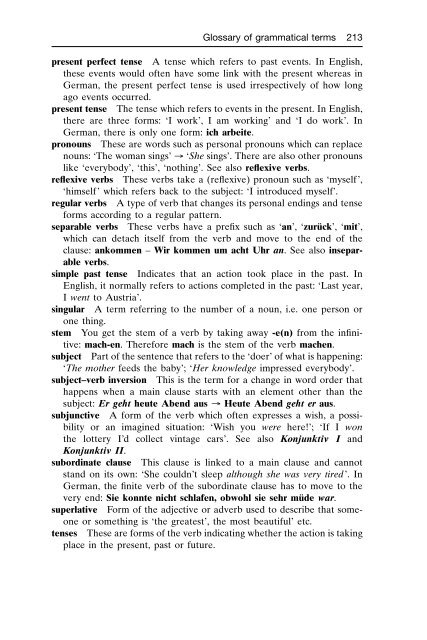Intermediate german
You also want an ePaper? Increase the reach of your titles
YUMPU automatically turns print PDFs into web optimized ePapers that Google loves.
Glossary of grammatical terms 213<br />
111<br />
2<br />
3<br />
4<br />
5<br />
6<br />
7<br />
8<br />
9<br />
1011<br />
1<br />
2<br />
13<br />
4111<br />
5<br />
6<br />
7<br />
8<br />
9<br />
2011<br />
1<br />
2<br />
3<br />
4<br />
5<br />
6<br />
7<br />
8<br />
9<br />
3011<br />
1<br />
2<br />
3<br />
4<br />
5<br />
6<br />
7<br />
8<br />
9<br />
4011<br />
1<br />
2<br />
3<br />
41111<br />
present perfect tense A tense which refers to past events. In English,<br />
these events would often have some link with the present whereas in<br />
German, the present perfect tense is used irrespectively of how long<br />
ago events occurred.<br />
present tense The tense which refers to events in the present. In English,<br />
there are three forms: ‘I work’, I am working’ and ‘I do work’. In<br />
German, there is only one form: ich arbeite.<br />
pronouns These are words such as personal pronouns which can replace<br />
nouns: ‘The woman sings’ → ‘She sings’. There are also other pronouns<br />
like ‘everybody’, ‘this’, ‘nothing’. See also reflexive verbs.<br />
reflexive verbs These verbs take a (reflexive) pronoun such as ‘myself’,<br />
‘himself’ which refers back to the subject: ‘I introduced myself’.<br />
regular verbs A type of verb that changes its personal endings and tense<br />
forms according to a regular pattern.<br />
separable verbs These verbs have a prefix such as ‘an’, ‘zurück’, ‘mit’,<br />
which can detach itself from the verb and move to the end of the<br />
clause: ankommen – Wir kommen um acht Uhr an. See also inseparable<br />
verbs.<br />
simple past tense Indicates that an action took place in the past. In<br />
English, it normally refers to actions completed in the past: ‘Last year,<br />
I went to Austria’.<br />
singular A term referring to the number of a noun, i.e. one person or<br />
one thing.<br />
stem You get the stem of a verb by taking away -e(n) from the infinitive:<br />
mach-en. Therefore mach is the stem of the verb machen.<br />
subject Part of the sentence that refers to the ‘doer’ of what is happening:<br />
‘The mother feeds the baby’; ‘Her knowledge impressed everybody’.<br />
subject–verb inversion This is the term for a change in word order that<br />
happens when a main clause starts with an element other than the<br />
subject: Er geht heute Abend aus → Heute Abend geht er aus.<br />
subjunctive A form of the verb which often expresses a wish, a possibility<br />
or an imagined situation: ‘Wish you were here!’; ‘If I won<br />
the lottery I’d collect vintage cars’. See also Konjunktiv I and<br />
Konjunktiv II.<br />
subordinate clause This clause is linked to a main clause and cannot<br />
stand on its own: ‘She couldn’t sleep although she was very tired’. In<br />
German, the finite verb of the subordinate clause has to move to the<br />
very end: Sie konnte nicht schlafen, obwohl sie sehr müde war.<br />
superlative Form of the adjective or adverb used to describe that someone<br />
or something is ‘the greatest’, the most beautiful’ etc.<br />
tenses These are forms of the verb indicating whether the action is taking<br />
place in the present, past or future.



